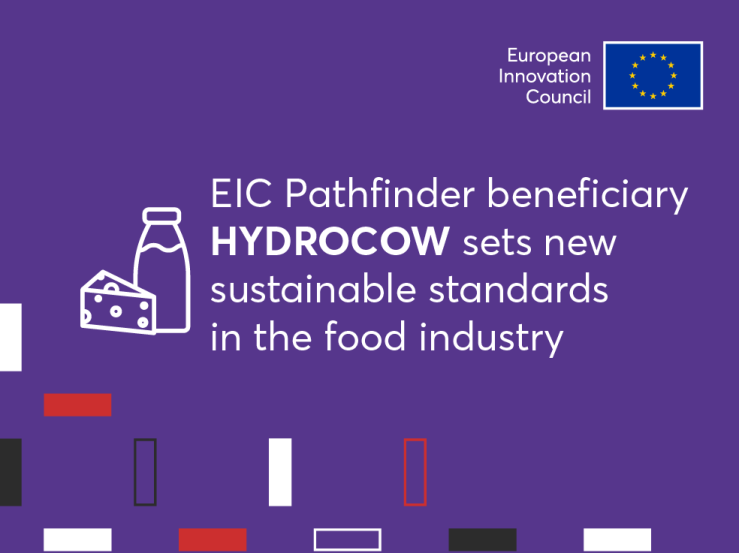In a stride towards sustainable food production, the EIC-funded HYDROCOW project, coordinated by Solar Foods, will revolutionise the dairy industry. Traditional milk production methods, while essential for our nutrition, have long been associated with significant environmental impacts. These include greenhouse gas emissions and extensive land use. Addressing these challenges, HYDROCOW aims to create a net-zero carbon dairy protein production platform to help transform the way we produce and consume dairy proteins.
EDIT: As of early September, Solar Foods has listed its shares on Nasdaq First North Growth Market Finland, moving the company a step closer towards its aim of growing its business to a global scale. In the same weeks, Solein® obtained its self-affirmed Generally Recognised as Safe (GRAS) status in the United States, where sales could start by the end of the year.
Transformative technology for a greener future
At the heart of the HYDROCOW project lies an innovative bacterial protein secretion system. Using the engineered hydrogen oxidising bacterium Xanthobacter sp. SoF1, this system converts CO2, and soon nitrogen, into food-grade protein. This breakthrough technology decouples protein production from traditional agricultural practices, significantly reducing the environmental footprint of dairy protein production.
Key achievements and goals
HYDROCOW has already made impressive progress in its mission to revolutionise dairy protein production. The project has successfully developed a bacterial protein secretion system capable of producing beta-lactoglobulin, a major milk protein component. Through a thorough design-build-test-learn (DBTL) cycle, the team has optimised the production process, ensuring high efficiency and sustainability.
'We, at Solar Foods, are very excited about the HYDROCOW project, as it provides us with a completely new technology platform' says Pasi Vainikka, CEO of Solar Foods.
‘This technology has the potential to transform us from a protein hydrogen fermentation company to a general hydrogen fermentation company’, continues Dr Vainikka. ‘In other words, the HYDROCOW technology can massively expand our range of end products, while maintaining the minimal environmental footprint that our protein fermentation allows’, he adds.
Positive impact and prospects
The HYDROCOW project is bound to transform not only dairy protein production, but also the production of proteins for multiple applications, including materials and therapeutics. By eliminating competition for valuable feedstocks such as glucose, HYDROCOW contributes to the sustainable development of our society. The knowledge generated by this project will benefit a growing research and application community focused on autotrophic, microbial production systems.
Solar Foods: a pioneer in the production of innovative proteins
In addition to the HYDROCOW project, Solar Foods is making waves in the food industry with Solein®, a revolutionary protein produced using a bioprocess that feeds microbes with gases (CO2, hydrogen, and oxygen) and small amounts of nutrients. This groundbreaking process produces Solein®, a nutritious yellow powder that is highly functional and compatible with a wide range of traditional ingredients. Solar Foods recently launched Factory 01, its first commercial-scale Solein® production facility in Vantaa, Finland.
Solein® highlights:
- It received its first innovative food regulatory approval in Singapore in 2022.
- There is a potential of producing up to 160 tonnes of Solein® per year at Factory 01.
- It can produce protein in harsh conditions, independent of traditional agriculture.
- It is highly sustainable, using only a fraction of the water and land required in conventional protein production.
Leading the way in sustainable protein production
The success of HYDROCOW and Solar Foods's groundbreaking work with Solein® represents a significant leap forward in the quest for sustainable food production. By using cutting-edge biotechnology, both projects are setting new standards for sustainability and efficiency in the food industry. The project's high-tech innovations pave the way for a greener future and demonstrate the immense potential of microbial production systems.
Additional information
HYDROCOW is a project funded by the European Innovation Council (EIC) as part of the EIC Pathfinder Challenges with a focus on innovative and high-risk research to accelerate the advancement of new technologies. Solar Foods coordinates the project, which benefits from the company’s expertise in sustainable protein production.
For more information on the HYDROCOW project and its transformative impact on sustainable dairy protein production, please visit the dedicated page on CORDIS.

DISCLAIMER: This information is provided in the interest of knowledge sharing and should not be interpreted as the official view of the European Commission, or any other organisation.

